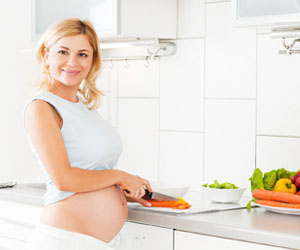Here’s how to find healthy foods you can keep down, so you can power through your first trimester of pregnancy!
Prior to getting pregnant, there was nothing I loved more than a juicy grilled chicken sandwich or some pulled pork piled high with fried onions. But somewhere in my second month, that all changed. Just the thought of meat made me nauseous; the smell of it cooking sent me running to the toilet. As the list of foods I was avoiding began to mount, I started worrying that my morning sickness diet of bagels and ginger ale was depriving my baby of any nourishment.
Sarah Mullin, a mom-to-be in Raleigh, NC, experienced the same anxiety during the two months she struggled with nausea and vomiting.
“I was exhausted, weak, and worried that the baby wasn’t getting enough nutrients,” she says. Fortunately, as awful as you may feel, the baby is insulated from your misery, says Randy Fink, M.D., medical director of the Miami Center of Excellence for Obstetrics and Gynecology. “Most women have enough excess nutrients that the baby is getting what it needs,” he says. “I tell women that in the first trimester, they’re in survival mode. Forget obsessing over a perfectly balanced diet. If you’re having horrible nausea, the best you can do is try to get through by eating what you can keep down.”
Instead of three regular meals, Fink says that many women find eating six to eight small meals is easier on their digestion, because letting your belly get too empty or too full can trigger morning sickness. He’s sure to clarify the word “meal,” too — it may be just a piece of fruit or a bagel. The key is to find foods that are kind to your churning stomach and still have nutritional benefits. For example, a bowl of oatmeal is satisfying, but goes down easy. And just one packet of instant has about 40% of your daily iron needs.
First-trimester power foods
Although Saltines and dry toast can fill your belly a bit and soak up excess bile, settling your digestion, they don’t offer much nutrition, says Allison Tannis, M.S., R.H.N, co-author of The 100 Healthiest Foods to Eat During Pregnancy. She recommends enhancing your crackers and toast by adding healthy toppings. Peanut butter, for instance, is generally well tolerated by an upset tummy, plus it’s packed with protein, niacin, and folate. The latter is particularly important because most women don’t get enough of it in their normal diets, Tannis says.
Another lesser-known but smart choice is tahini. This Middle Eastern spread is made from sesame seeds, which carry the power of omega 6—a healthy fatty acid that’s required for immune-system function. You can try tahini alone, but it’s also an ingredient in hummus, another excellent spread for perking up plain bread. When you get tired of these, you can also try almond butter, Tannis says. “Just don’t turn to that nutrition-deprived can of Easy Cheese!”
Fruit can also be easy on troubled tummies. Susan Rau Fritts, a new mom in St. Paul, MN, says she suffered morning sickness her entire pregnancy, but after her 12th week she could eat fruit all day long. “I particularly loved grapes and watermelon,” she says. Jonny Bowden, Ph.D, CNS, co-author of The 100 Healthiest Foods to Eat During Pregnancy, says watermelon is a common favorite because it’s 90 percent water, making it bland—with just enough sugar to satisfy your sweet tooth. He adds, “Its water content also makes it filling and it’s easy to break down and digest, making it the perfect morning sickness food.”
The carb quotient
Nausea drives most women to load up on carbohydrates. Jennifer Mohtashami, a mom from Missouri City, TX, who’s pregnant with her second child, says they’ve been her primary food source. “Don’t stand between me and a potato these days,” she says. “Bread, potatoes, rice, and pasta are all I really feel like eating.”
Carbs can be very comforting, but opt for the healthier varieties—whole-wheat pasta and bread, for instance. Bowden also says that brown rice is the “nutritional champion” over white and contains about four times more fiber. Plus it offers vitamin B6, which studies have shown can play a role in combating morning sickness.
While nausea and vomiting are two of the worst experiences of pregnancy, remember that baby is safe and sound—even when you’re not. “Nausea and vomiting can feel debilitating and provoke a lot of anxiety if you’re worried about hurting the baby,” Fink says. “But unless it’s an extreme case, as awful as you feel, you are not harming the baby. Although it’s tough, try not to get discouraged. In most cases, it does get better.”
— Lindsey Aspinall Getz
